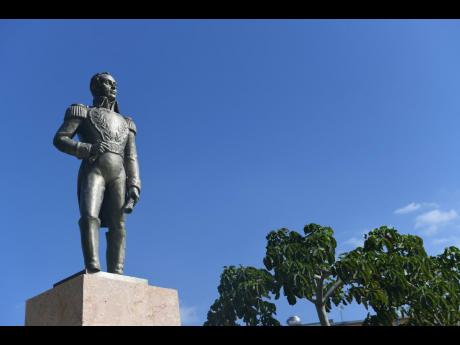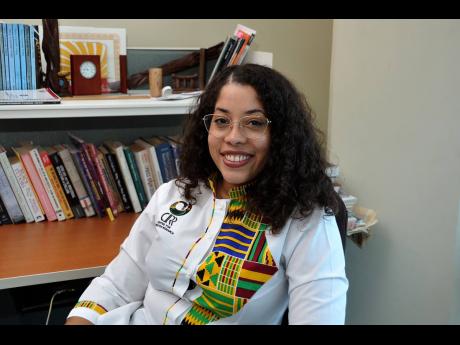Mia McMorris | Simón Bolívar and La Carta de Jamaica
September 6 was the 208th anniversary of La Carta de Jamaica (Letter from Jamaica), written by the revolutionary Simón Bolívar. As Jamaicans, we love to claim people as ‘One a We’, and we do claim Simón Bolívar.
We remember that Bolívar spent several months in Jamaica in 1815 while in self-imposed exile, that he wrote a famous letter to Spain openly criticising their management of their colonies in the west. We see the monument to him by National Heroes Circle, and we feel proud to know that we have this tangible connection to ‘El Libertador’.
What we seem to forget is that Simón Bolívar was not welcome in Jamaica. Also, the reality of his time in Jamaica, though transformative on a personal level, outside of Jamaica this moment is, as Francisco Cuevas frames it in his play Jamaica is the Eye of Bolívar (translated by Sylvia Wynter), like ‘a stone falling into a pool. The waters cover it over’. I want to reaffirm the impact of Bolivar’s experience in Jamaica and the lasting impact of La Carta de Jamaica on the reparatory justice movement.
JAMAICA – ONE A WE
Simón Bolívar arrived in Jamaica at a time when his movement to unify South America under the empire of New Granada had failed. In Jamaica, Bolívar hoped to gain wider support for his campaign for freedom. Outside of his initial encounter with the then governor of Jamaica, the duke of Manchester, few cared about his mission or his former status. Despite this, the Spanish saw Bolívar as too great a danger. Even with his clear separation from the physical revolution in South America, he narrowly survived an assassination attempt.
Bolivar’s ideology was as much a danger to the Spanish cause as his prowess in warfare. All the same, it didn’t make a difference in Jamaica; even with La Carta de Jamaica, and a few supporters of his cause, he was not able to secure what he needed to win freedom from Spain. He saw that his contemporaries in Jamaica would not sacrifice the security of their land and status, to break ties with Europe. Jamaicans did not want his revolution.
This is at odds with the representation of Bolívar in Jamaica today. His statue is prominently displayed. We openly celebrate the impact of his letter while in exile as an essential document for revolution in the Americas but we do not often publicise the fact that the government of the day did little to help him.
Indeed, during Bolívar’s time in Jamaica, he identified the true face of oppression in the Caribbean and the Americas: the power created by Europeans to oppress people they regarded as ‘other’, for their own gain. Although his missive is directly aimed at Spain, his experience in Jamaica creates a more rounded picture of the colonising attitudes in the Americas. Bolívar saw it clearly when he arrived in Haiti, newly independent from France through revolutionary struggle. Unlike Jamaica, Haiti was willing to support Bolívar openly, providing weapons, money, food and ships.
‘I shall never be its [Colombia’s] Oppressor’
At the core of Bolívar’s revolutionary thought was the idea that the New World should be free. He was determined to achieve it, for he believed in the right of
self-governance, to some extent freedom for enslaved Africans, and the elevation of persons born in the Americas to leadership roles. Bolívar’s suggestion of freedom for enslaved Africans came in 1816. However, he only considered for freedom those who had fought in his revolution. We see then that Bolívar considered chattel enslavement to be a problem worthy of some compensation, even if it is not nearly enough to qualify freedom as some sort of reward for joining the revolution.
PUSHBACK
Bolivar received enormous pushback from his contemporaries in South America for his ideas about ending chattel enslavement, even if only for a small number of them, for they depended heavily on enslaved labour for their plantations and businesses. He did not end chattel enslavement for enslaved Africans and indigenous peoples under his leadership. However, by 1821, any children born to enslaved Africans were born free and, in 1825, came the end of trafficking in Africans.
Oppression of ideas, culture, language, fashion and so much more merged with the physical violence carried out by Europeans in the Caribbean; and Bolívar sought to end such oppression. This is why, at the very beginning of La Carta de Jamaica, Bolívar highlights the intention to end the horrific actions of colonisers and their pretence that the continued oppression of people by the Spanish and Europeans at large was some fictitious nightmare. Bolívar states: “Our age has rejected these atrocities as mythical, because they appear to be beyond the human capacity for evil. Modern critics would never credit them were it not for the many and frequent documents testifying to these horrible truths.” - revolutionary, dangerous thoughts to empires who were already losing their tenuous grip, as a result of increasing protests throughout their territories. Frankly, it shouldn’t be shocking that the leaders of Jamaica did not want him there, he was adding fuel to the fire. Further, his assessment of the wilful blindness of colonisers is something we experience today with so many former colonisers attempting to place chattel enslavement in the past, even saying that we should get over it. It is disheartening to think that, even centuries later, we are unable to completely escape these attitudes.
Revolutionary figures like Simón Bolívar disrupt the foundational narratives against reparation. He shines the unyielding light of truth on the atrocities of colonialism, and the mismanagement which caused many colonies of the Americas to suffer when independence and ‘freedom’ were reluctantly given. So, yes we must celebrate Simón Bolívar’s time in Jamaica, and the essential nature of La Carta de Jamaica, but we must confront the uncomfortable truth that he was unsuccessful in his mission, indeed got no help for his mission in our island. At the same time, we must use aspects of La Carta de Jamaica to justify the fight for true freedom and reparatory justice.
Send feedback to reparation.research@uwimona.edu.jm


